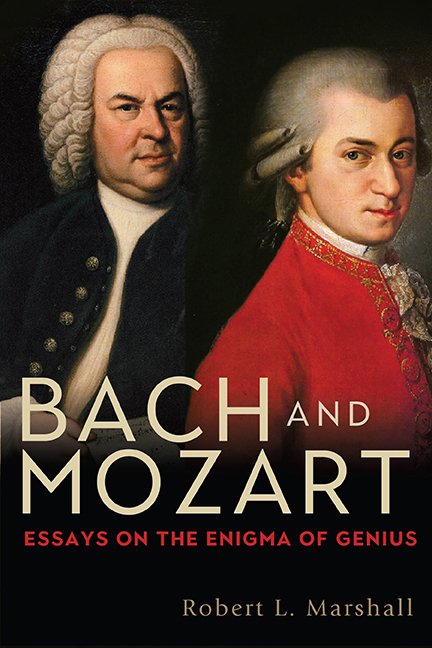Book contents
- Frontmatter
- Dedication
- Epigraph
- Contents
- List of Figures
- Preface
- List of Abbreviations
- Prologue. The Century of Bach and Mozart as a Music-Historical Epoch: A Different Argument for the Proposition
- 1 Young Man Bach: Toward a Twenty-First-Century Bach Biography
- 2 The Notebooks for Wilhelm Friedemann and Anna Magdalena Bach: Some Biographical Lessons
- 3 Bach and Luther
- 4 Redeeming the St. John Passion–and J. S. Bach
- 5 Bach's Keyboard Music
- 6 The Minimalist and Traditionalist Approaches to Performing Bach's Choral Music: Some Further Thoughts
- 7 Truth and Beauty: J. S. Bach at the Crossroads of Cultural History
- 8 Bach at Mid-Life: The Christmas Oratorio and the Search for New Paths
- 9 Bach at the Boundaries of Music History: Preliminary Reflections on the B-Minor Mass and the Late-Style Paradigm
- 10 Father and Sons: Confronting a Uniquely Daunting Paternal Legacy
- 11 Johann Christian Bach and Eros
- 12 Bach and Mozart: Styles of Musical Genius
- 13 Mozart and Amadeus
- 14 Bach and Mozart's Artistic Maturity
- 15 Mozart's Unfinished: Some Lessons of the Fragments
- Epilogue (ossia Postmortem). Had Mozart Lived Longer: Some Cautious (and Incautious) Speculations
- Notes
- Works Cited
- Index
- Miscellaneous Endmatter
- Eastman Studies in Music
7 - Truth and Beauty: J. S. Bach at the Crossroads of Cultural History
Published online by Cambridge University Press: 29 March 2020
- Frontmatter
- Dedication
- Epigraph
- Contents
- List of Figures
- Preface
- List of Abbreviations
- Prologue. The Century of Bach and Mozart as a Music-Historical Epoch: A Different Argument for the Proposition
- 1 Young Man Bach: Toward a Twenty-First-Century Bach Biography
- 2 The Notebooks for Wilhelm Friedemann and Anna Magdalena Bach: Some Biographical Lessons
- 3 Bach and Luther
- 4 Redeeming the St. John Passion–and J. S. Bach
- 5 Bach's Keyboard Music
- 6 The Minimalist and Traditionalist Approaches to Performing Bach's Choral Music: Some Further Thoughts
- 7 Truth and Beauty: J. S. Bach at the Crossroads of Cultural History
- 8 Bach at Mid-Life: The Christmas Oratorio and the Search for New Paths
- 9 Bach at the Boundaries of Music History: Preliminary Reflections on the B-Minor Mass and the Late-Style Paradigm
- 10 Father and Sons: Confronting a Uniquely Daunting Paternal Legacy
- 11 Johann Christian Bach and Eros
- 12 Bach and Mozart: Styles of Musical Genius
- 13 Mozart and Amadeus
- 14 Bach and Mozart's Artistic Maturity
- 15 Mozart's Unfinished: Some Lessons of the Fragments
- Epilogue (ossia Postmortem). Had Mozart Lived Longer: Some Cautious (and Incautious) Speculations
- Notes
- Works Cited
- Index
- Miscellaneous Endmatter
- Eastman Studies in Music
Summary
During his lifetime, and for sometime thereafter, Bach was a contemporary com-poser. That means, among other things, that he had not yet acquired the status of immortality and was not beyond criticism. In the year 1737, at the very pin-nacle of his career, and only six months after having been conferred the lofty title of “Composer to the Court Chapel of His Royal Majesty in Poland” (Compositeur bey der Königlichen HofCapelle), Bach was taken severely to task, in print, by his former pupil, Johann Adolph Scheibe (1708–76), in the following terms:
This great man would be the admiration of whole nations if [his music] had more charm, if he did not take away the natural element in his pieces by giving them a turgid and confused style, and if he did not darken their beauty by an excess of art…. He demands that singers and instrumentalists should be able to do with their throats and instruments whatever he can play on the clavier…. Every ornament, every little grace … he expresses completely in notes; and this not only takes away from his pieces the beauty of harmony but completely covers the melody throughout. All the voices must work with each other and be of equal difficulty, and none of them can be recognized as the principal voice…. Turgidity has led [him] from the natural to the artificial, from the lofty to the somber; one admires the onerous labor and uncommon effort—which, however, are vainly employed, since they conflict with Nature.
Scheibe's critique, of course, is one of the most famous documents of its kind in the history of music, not least because it was far more than simply one man's opin-ion. It was also an ideological manifesto to which we shall return in due course.
Bach himself was by no means unaware of the unusual difficulty his music posed. Referring to his church compositions in an official document written less than a year before Scheibe's attack, Bach described them as “incomparably more difficult and more intricate” (ohngleich schwerer und intricater) than those by other composers.
- Type
- Chapter
- Information
- Bach and MozartEssays on the Engima of Genius, pp. 121 - 129Publisher: Boydell & BrewerPrint publication year: 2019



